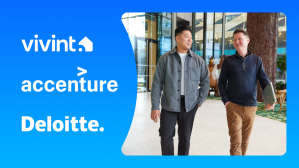Key Takeaways
- Agentic deployments are only effective when driven by clean, structured data and deep context, requiring companies like Heathrow and Safari365 to invest heavily in data integrity before deployment.
- When it comes to AI rollouts, companies often have to treat challenges (like lack of reporting or restrictive initial parameters) as learning opportunities, using continuous dashboard monitoring and alignment between agents and human teams to refine and scale deployments.
Companies are under pressure to move through their AI deployments quickly so they can get to ROI as soon as possible. But technologies as powerful as AI and agents aren’t always easy to roll out. Data needs to be organized. Guardrails need to be determined. Knowledge articles need to be created. Often, it’s hard to know how well something works until the fail points make themselves known.
One key to success, said Peter Burns, Director of Marketing, Digital & eCommerce at Heathrow Airport, is data. “This may sound obvious, but of course it’s an important one. And that’s data. An agentic experience is only as good as the data that drives it. So in Agentforce, Salesforce brings a great front-end experience for us that continues to learn,” he said. “But it’s the business’s responsibility to bring that data in a structured way and the right way to drive the right experience.”
Heathrow’s customer service agent, called Hallie, can answer questions about things like security checkpoint wait times, restaurant locations, and gate directions. One reason it works so well, said Burns, is that all of Heathrow’s customer data sits in Data 360. “We spend a lot of time focusing on the quality of that data and ensuring it’s matched to our customers to give them the information they want at the right stage of the journey.”
These Salesforce customers faced challenges along the way to becoming Agentic Enterprises — but they treated them as valuable learning opportunities, making smart, iterative adjustments that ultimately strengthened their deployments. They’re lessons that can help guide other companies along the Agentic Enterprise journey.
Engine: Overcoming Missed Connections
Engine is a travel platform where businesses and groups can reserve hotels, flights, and car rentals. Sometimes, though, those groups have to cancel those bookings. Now Eva, Engine’s Agentforce-powered assistant, can take that on. If someone wants to cancel three rooms from a 15-room reservation, Eva can combine data from the customer’s profile and interaction history, connect to the company’s internal booking platform, and cancel the unwanted rooms, without human reps needing to spend valuable time on an administrative task.
The upside of this work is evident in both cost savings and customer satisfaction. The company is currently anticipating saving $2 million through its ability to handle queries without human intervention. More importantly, the continuous feedback loop allowed Engine to improve its Customer Satisfaction Score from 3.7 to 4.3 out of 5.
The journey to deploying Eva did have a few delays and missed connections. One pain point was a lack of visibility: “We didn’t have reporting,” explained Demetri Salvaggio, VP of Customer Experience & Operations, and the team had to put manual reporting in place while waiting for out-of-the-box analytics. Today, however, with Agentforce Studio they can see what Eva struggles with and resolve it. One example: Eva initially provided a confusing answer in response to queries about wedding blocks. Engine’s deployment team reviewed this “moment” in the dashboard and wrote a new knowledge article for that use case, ensuring Eva would have the information it needed to respond correctly in the future.
Looking ahead, Engine will continue working on its Agentforce voice implementation — ensuring the right tonality, speed, and tenor to reflect the brand. It’s also focused on creating a “build-once” platform that allows the company to deploy automations seamlessly across all channels, reducing tech debt and improving scalability. The company also hopes to expand into voice-to-text applications to further enhance efficiency, accessibility, and customer insight — so customers have less trouble and more travel.
DeVry University: Learning How to Help Students Learn
DeVry University has long served a unique population — adult learners pursuing degrees and credentials that fit into busy, often unpredictable lives. In fact, more than 80% of its learners are over 25, many of whom are balancing careers, caregiving, and school.
“Our students engage with us around the clock, often when we’re not immediately available,” said Chris Campbell, CIO of DeVry University. “We needed a way to ensure students could get accurate, helpful information anytime — not just when staff were online.” To meet that goal, DeVry turned to Agentforce to create an always-on, AI-powered support experience for learners.
However, DeVry faced two key challenges. The first involved DeVryPro, the university’s AI-powered online learning platform designed to help modern workers adapt to emerging technologies. Initially, the agent’s responses were too restrictive, often saying, “I can’t answer that here.” After analyzing real conversations, the team adjusted the parameters, expanding its ability to provide relevant, actionable insights. Within 48 hours, engagement improved significantly.
The second challenge arose with one of DeVry’s student portal agents designed to help current learners navigate the academic catalog. The issue wasn’t accuracy but context. Without course history, the agent often recommended completed or irrelevant courses. DeVry’s solution was to integrate structured data sources, giving the agent the awareness needed to personalize responses in real time.
These improvements marked another step in the university’s evolution toward an AI-enabled, student-centered model — one that incorporates automation and human insight to deliver care when and where students need it most.
“Technology should enhance human connection, not replace it,” said Campbell. “With Agentforce, we’re able combine automated accuracy with human care — working together to support students whenever and however they need it.”
Indeed: Understand That Agentic Implementations Are Like No Other
Indeed launched agents across the company’s workflows to make the job search even faster, but the company quickly realized that three things make agent deployment different from other tech implementations. First, agent deployments require fundamentally changing team structures — who is involved in building these types of products — and modifying other internal processes.
Then there was the question of data sources. “The more context the agent has, the more powerful,” said Linda West, VP of Business Automation. “Investing a lot of time in understanding what data sources are going to enrich the context for the agent is such a critical part of the process to ensure the agent is as powerful as it possibly can be.”
Finally, Indeed found that alignment with human teams is essential. “You can’t underestimate the fact that in most of these cases, you need humans and agents to work here hand in hand,” said West. This alignment required clarity with the “human teams” on the vision and the problem set — a key element of any company’s agentic implementation strategy.
Safari365: All in on Data 360
In the early days of Safari365, the company managed $30,000 custom trips with spreadsheets and Word docs. A single itinerary could involve 20 vendors across multiple destinations, and the tech stack was totally fragmented. Leads came from one tool, emails were sent from another, and availability lived elsewhere. “It was impossible to get a full picture of the customer journey,” said Marcus Brain, Founder of Safari365, which is one of Africa’s leading tour operators. “We had no way to track performance, spot bottlenecks, or understand where we were losing potential travelers.”
When Safari365 initially got started with Salesforce, it was a big lift to rebuild all of the pricing logic into the system — the company had 3,000 different suppliers, each with different rules. (For example, what’s the fee for sharing a room with a child versus with a partner?) But, said Brain, the focus on data was worth the effort. When Safari365 recently got started with Agentforce, it had actually just completed another major data cleanup. The timing was perfect. “Because our data is so clean and structured, we were in a great position to launch Agentforce,” said Brain. “We could immediately take advantage of the automation because all the inputs were already there, deeply integrated into our workflows.” Now, when customers book a trip, they get a personalized set of “day notes” telling them exactly what each day of their custom trip will look like. Or Agentforce can go back to a conversation with the customer from years ago and pull up the fact that the client’s son loves elephants and suggest a close-up experience.
Next up? Safari365 is going all in on Data 360. “Right now, so much of our staff’s time is spent calling small bush camps and digging through third-party sites. That’s not structured Salesforce data,” said Brain. With Data 360, “we’ll be able to marry external data — like TripAdvisor reviews or Booking.com content — with our internal records. It’ll help us vet new suppliers, enrich itineraries, and take our personalization to the next level.”






















